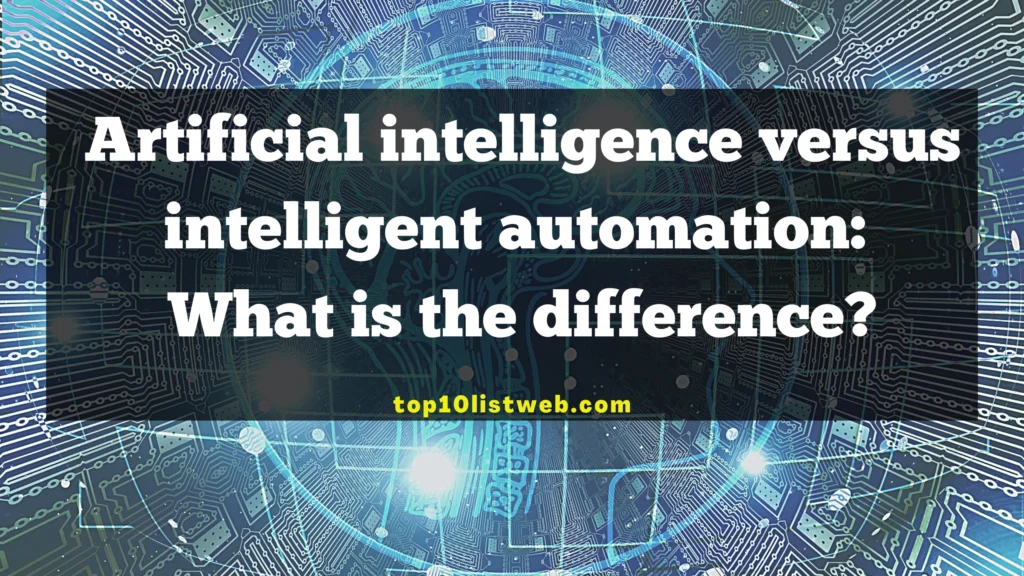Businesses require spending many hours a week, for making data entry manually, along with other repetitive tasks. That is equal to three full-time workers. But with the rise in intelligent automation, organizations can easily automate those tasks and free their employees to focus on valuable work.
| Telegram | Subscribe |
| Follow | |
| Website | Click here |
Intelligent automation mixes the power of automation with artificial intelligence to automate daily tasks, enhance productivity and create valuable insights.

Artificial intelligence and intelligent automation
Artificial intelligence (AI) and intelligent automation (IA) are two major technologies revolutionizing business operations. AI is capable of performing tasks that need human intelligence, like perception, decision making and reasoning.
And on the other hand, IA mixes AI with various automation technologies for the automation of repeating and rules-based processes. Even though these terms are being used interchangeably, they refer to various concepts with varied goals. So, artificial intelligence vs intelligent automation: What’s the difference?
With the right understanding of the difference between AI and IA, it’s easy for organizations to enhance their productivity and effectiveness. Here in this article, we will learn about artificial intelligence and intelligent automation and how both are different from each other.
What is artificial intelligence?
AI denotes designing and creating computer programs that will carry out tasks that would otherwise need human intelligence, like speech identification, translation of language, decision-making, learning from various experiences and visual awareness.
In simple words, AI refers to applications that are not hypothetical and can draw real conclusions or make independent decisions. It’s a well-set algorithm that can do tasks like identifying an image or face, understanding the documents, and many more things.
Artificial technology is a comprehensive technology that allows businesses to reconsider how they are collecting and processing data and using decision-making insights. It utilizes string datasets and computer science methods for solving issues. It involves sub-sectors like deep learning and machine learning.
Some of the best examples of artificial intelligence include Robo advisors, email spam filters, Netflix recommendations and simple bots. AI apps trained for some particular purpose can sort and classify organized and unorganized data. Deep insights about these trends and complete data analysis can reveal several trends and patterns that will help businesses improve themselves.
What is intelligent automation?
IA, cognitive automation, uses automation technologies, AI, business process management, and robotic process automation for streamlining and scaling decisions in various organizations.
IA can simplify the process, free up resources and enhances operational effectiveness. For instance, an automobile manufacturer can make use of intelligent automation to speed up production or decrease human error.
Similarly, a pharmaceutical company can use IA to decrease costs and gain some resource effectiveness where there are repeating processes. An insurance provider can utilize intelligent automation to calculate payments, make predictions for calculating rates and address all compliance requirements.
Three important components of intelligent automation
Intelligent automation consists of three technologies combination of which makes a solution that supports the easy transformation of business and technology.
- Artificial intelligence is the most important component of intelligent automation, which uses machine learning and complicated algorithms to analyze structured and unstructured data. Depending on those data, businesses can prepare a knowledge base and frame some predictions. This is the decision engine of IA.
- The second important component includes business process management or BPM, also called business workflow automation. It helps automate workflows to offer agility and constancy to all business procedures. BPM is used in various industries for streamlining processes and enhancing interaction and customer engagement.
- The third component is robotic process automation, which uses software robots to complete various back office tasks like extraction of data or filling forms.
Role of intelligent automation in businesses
Intelligent automation integrates basics like RPA but enhances business capabilities through AI-powered tools. These platforms connect various systems.
For instance, a financial institution that supervises transactions for fraud can utilize IA platforms to connect the dots between various systems. Such workflows involve flagging transactions, checking sanction lists, authoring reports, and many more.
With intelligent automation, the whole business process can be transformed for achieving some specified purposes from end to end. There are endless applications of IA. Through such technology, businesses can easily obtain solutions for issues that are difficult to automate.
IA tools take decisions depending on various data sources, past choices and training orders. Humans get engaged in the whole process of approving that decision and supervising outcomes. Fast operations, low costs and valuable insights for novel business enhancements are possible.
Businesses that invest in time, organization efforts and planning for deployment of intelligent automation plans obtain benefits that can positively affect how you are doing business. Some of the benefits are
Associate legacy systems with novel technologies
It helps ease the problem of modernization while obtaining some AI-driven insights into how you are processing work and where you can improve.
- Low operation cost: When automation uses AI technologies, it will make processes fast, which will save money. It will also decrease human errors that cause loss of money. In many cases, IA tools help better payroll management through process enhancement.
- Decreases risk: When implemented in sectors with all strict regulation needs or when managing risk becomes an everyday task, intelligent automation with artificial intelligence solutions makes complicated undertakings easy to digest.
- Better consumer-facing results: Intelligent automation is not just for enhancing the back office but is an important element in offering the best seamless consumer experience. Think of an intelligent procedure that does classification and analysis of loan applications, refers to several sources and offers quotes for rates. With IA, it’s possible to achieve good customer service.
How is artificial intelligence different from intelligent automation?
Artificial intelligence and intelligent automation are two kinds of technologies that are revolutionizing business operations. They are related to each other but have different technologies. Both of them include automation and use all the latest algorithms, but they are different in their functionality and scope.
AI mainly includes developing algorithms and different models for performing tasks that need human intelligence and can automate tasks like speech recognition, predictive analysis, etc.
Intelligent automation mixes AI with automation for the automation of repeating tasks and routine work. It is responsible for automating tasks like data entry, document process, and consumer service, thereby facilitating different organizations to decrease costs, enhance productivity, and increase consumer experience.
In simple words, AI focuses more on replicating or augmenting human intelligence, and IA focuses on automating daily tasks to enhance effectiveness and productivity. Both technologies can offer high-benefit businesses, but they are best utilized in varied contexts and for distinct purposes.
The below table shows some basic difference between artificial intelligence and intelligent automation.
| Artificial intelligence | Intelligent automation |
| Complicated environment that can know about its environment and it past actions. | Enhances productivity in different organization |
| Make use of machine learning and other deep learning technologies for producing human behavior and human intelligence. | Automates daily tasks that usually take a long time when done manually. |
| Run various algorithms and go through various database to provide valuable insights | Make use of the existing data of the organization from various technologies and offer large scale analysis of data. |
| Removes some daily tasks and provide informative decision. | Creates valuable insights from cross domain sources of data. |
| Collects data based on the consumer previous purchases and allow sales staff to make better decisions. | Increases consumer experience and reorganizes workflows. |
While AI and intelligent automation are different, they are not equally exclusive. But they balance each other to deliver more benefits. AI technologies increase the capability of intelligent automation and make it more intelligent, adaptive and proficient in managing complicated scenarios.
Organizations can crack some novel potentials by incorporating AI into automation and driving innovation. They can automate processes normally considered complicated or need human judgement, resulting in enhanced productivity and effectiveness.
In addition, by uniting AI with automation, businesses can easily create intelligent systems that can measure and manage big volumes of data and work in real time.
What benefits do intelligent automation offer when compared with automation?
Intelligent automation outshines managing unorganized data, acclimating and learning from data and allowing the latest decision-making. It can analyze text, images and videos, consistently enhancing its performance by learning and making intelligent decisions depending on complicated rules and real-time data.
How intelligent automation increases operational effectiveness?
By automation repetitive and rule-dependent tasks, intelligent automation decreases errors, removes physical effort and releases human resources for value-added activities. This leads to enhanced operational effectiveness and production.
What are some of the applications of AI and intelligent automation?
AI has many applications in several fields, including healthcare diagnostics, customized marketing, fraud detection, and autonomous vehicles. Intelligent automation is used in areas such as finance and accounting, consumer services, analyzing data and supply chain management for automating and optimizing business processes.
Can AI and intelligent automation work together?
Yes, AI technologies increase intelligent automation’s capabilities by adding intelligence, decision-making capabilities and adaptability. Incorporating AI into automation systems allows organizations to automate complicated tasks, manage unstructured data, and make intelligent decisions depending on real-time data.
How can businesses make use of AI and intelligent automation efficiently?
Businesses can use AI and intelligent automation by recognizing the process best for automation, understanding all abilities of AI technologies, investing in the right talent and infrastructure, and consistently supervising and optimizing the executed solutions. It needs a planned approach and collaboration between businesses and technology stakeholders.
Conclusion
Artificial intelligence and intelligent automation are two interrelated concepts, but they signify distinct aspects of applications and technologies. AI focus on mimicking human intelligence in machines; intelligent automation mixes AI abilities with automation for automating and optimizing business processes. Properly understanding the differences and similarities between both technologies is important for organizations looking to leverage their drive and potential.
Also Read:
- ChatGPT vs Bard: which is better? 10 point comparisons
- Top 10 distinctive features of Bard AI of Google
- How to buy Chat GPT stock in 2023?
If you feel this article is knowledgeable and interesting, then you must read other articles on this website. Click here to read other articles now.
Subscribe us on Telegram app for regular updates. Click here to subscribe.
You can allow top10listweb.com to send notifications when publishes a new article.
FAQs
What is the primary difference between artificial intelligence and intelligent automation?
The primary difference between Ai and IA is in their focus and scope. While AI focuses on simulating human intelligence in machines allowing tasks that need cognitive capabilities, intelligent automation incorporates AI technologies with various automation tools for automating and optimizing business processes.
Can you use AI and intelligent automation interchangeably?
Even if the terms are related, they are not interchangeable. AI refers to the broad concept of pretending human intelligence, whereas intelligent automation mixes AI technologies and automation tools for enhancing and streamlining various processes.
What are some of the important components of AI?
AI includes machine learning, robotics, natural language and computer vision. All these components allow machines to learn from data, comprehend and infer human language, identify visual data and carry out tasks that need human involvement.
What is the difference between automation and intelligent automation?
Automation focuses more on rule-dependent automation, where software robots implement all pre-defined rules. Intelligent automation integrates AI technologies, helping systems manage unorganized data, learn from various patterns and make intelligent decisions.
Is it possible for intelligent automation to manage tasks that need human intelligence?
Yes, intelligent automation uses AI abilities to manage tasks that need cognitive capabilities. Uniting automation with machine learning and some natural language processing can easily automate complicated and perceptive tasks that would have otherwise needed human interference.

